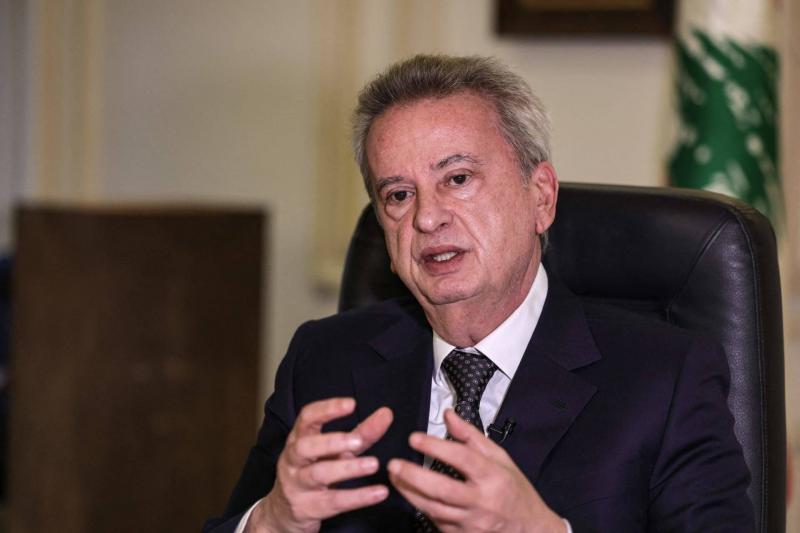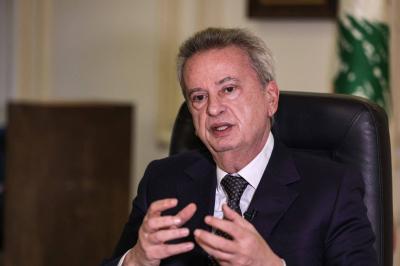Lebanon's central bank governor, Riad Salameh, confirmed that this will be his "last term," stating, "In a few days, I will close this chapter of my life." He added, "I have appreciation for the central bank's deputies; we were a cohesive team over the past three years. Despite our differences, our primary concern was serving Lebanon, and today we are at a crossroads as there is no appointment for a new governor."
In an interview with "LBCI," he announced that "the GDP has risen to 55 billion dollars, and deposits in the banking sector have increased to over 170 million dollars during my term," noting that "my term will end on July 31, and this matter is decided."
Regarding the central bank deputies, Salameh explained that their task is to take over the institution and wished that "it remains steadfast as it is." He described the crisis as revolving around demands placed before the government and emphasized that the central bank is not involved in the relationship between him and the deputies. He assured, "No one exercises dictatorship in the central council, and the first steps of serious reform start with eliminating the possibility of the state borrowing from the central bank."
He added, "The deputies have not claimed that I violated the laws and decisions that come from the central council, such as the circulars, which the governor is responsible for implementing, alongside the implementation of the money and credit law."
Concerning the manipulation of the dollar's exchange rate, he indicated that "intervention in the currency market to buy and sell dollars was done in agreement with Minister of Finance Youssef Khalil, not on the council's decision." He remarked on the significant rise in the exchange rate, which exceeded 150,000 Lebanese pounds.
Salameh denied any possibility of manipulating the exchange rate in the market, saying, "The market trusts my words, and when I say I will intervene, the exchange rate changes."
Regarding the "Sayrafa" platform, he stated, "The Bank of Lebanon managed through Sayrafa to be the main player in the currency market and to regulate it." He viewed that "the economy benefited from Sayrafa, and June was the best month for economic activity since 2013, according to a bank study." Salameh continued, "The Bank of Lebanon succeeded in being the primary player in the cash economy and in regulating the market, and Sayrafa contributed to economic growth, benefiting many people; there is no logic in accusing Sayrafa of being a money laundering platform."
On the deputies' proposal to create an alternative platform to Sayrafa, he argued that "creating a platform without the central bank's intervention requires time," asserting that "the central bank should remain in the market because there is no supply of dollars, only demand, which threatens the lira, and the situation is stable today." He confirmed that "he does not want to abolish Sayrafa since it has made the central bank a key player in the market," indicating that "the difference between Sayrafa and the market is about 8% in Lebanese pounds."
Salameh announced that he "has completed everything requested by the International Monetary Fund, starting from auditing the assets of the Bank of Lebanon and progressing through the implementation of banking reforms." He emphasized that "the Bank of Lebanon was the first state institution to bring in auditing firms, and not a year has passed without auditing, the latest being done by the IMF, with the aim of complementing the structure to place all responsibility on the central bank."
Salameh pointed out that "the Bank of Lebanon seeks to restore deposits," assuring, "We did not allow banks to go bankrupt to protect the deposits. Everyone who attacked us did not propose any project; we want to maintain liquidity for the Bank of Lebanon and will not shy away from our responsibilities."
He clarified that "the trade balance deficit is historic because we lack natural resources and exports, and we want the dollar to be accessible to everyone, which has happened." Revealing details about the return of depositors' funds, Salameh disclosed that "the existing gap amounts to 71 billion dollars, and there should be an approach to study which deposits can be repaid in dollars and those that can be repaid in pounds."
He observed that "the sustainability of banks requires a clear vision from the state regarding banking reform, and based on this vision, some banks will be able to continue while others will not."
Salameh warned: "When the state collapses, there will be a crisis for the 'central bank' in providing liquidity to avoid a total system collapse." He revealed, "The state has borrowed 20 billion US dollars from the Bank of Lebanon, in addition to 54 trillion Lebanese pounds, and it has taken 16 billion US dollars, which are not losses for the 'central bank.'"
He added, "The cash economy harms Lebanon because it allows outsiders to accuse us of many things, and circular 158 ensures transparency." He emphasized that "the Bank of Lebanon fulfills its role, and no accounts in the Bank of Lebanon are linked to political officials, but rather to public sector accounts and banks."
He pointed out that "the banks' job is to lend to stimulate the economy, and from 2019 until today, 30 billion dollars of deposits have been repaid, with the current volume of deposits reduced to 90 billion dollars." He remarked that "the leaks that occurred, especially from foreign judiciary sources, indicate that a group targeted me for specific reasons; this group hired a lawyer who was not truthful in his report, based on which he filed a complaint against me within two weeks."




